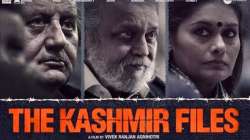The Kashmir Files' distraught testimonials show new India an old gruesome photo of Kashmiri Pandits
While many question the veracity of these horrendous stories, Agnihotri asserts to have interviewed 700 Pandits making his film more of a documentary than a routine Bollywood outing. In contrast to popular opinion, Agnihotri's film does not entirely show the killings as consequential to the displacement of the Kashmiri Pandits. It is instead a docudrama in the setting of India's ideological conflict in the polarised divide of politics via academia.

The world recalls what happened to the Jews. The account of horrors the persecuted minority met at the hands of the Nazi Army is known to all and it sends shivers down the spine. However, closer to home, what the Kashmiri locals went through in 1990 was brushed under the carpet or discussed in hushed voices until now. Three decades later, Vivek Ranjan Agnihotri's film 'The Kashmir Files' attempts to show what transpired in Kashmir and what Kashmiris went through. The horrific memories are as painful as the 1947 India-Pakistan partition and the testimonials are so gruesome that it takes effort to come to terms with the truth.
Traversing through timelines, he shows three generations of Kashmiri Pandits. The first one that encountered the monstrosities of the genocide, the second generation that recognises the screams in distance and the third generation that has heard multiple interpretations of the exodus. Agnihotri also gives a window to the contradictory philosophies of the Leftists by giving the stellar role of JNU Prof Radhika Menon to his wife Pallavi Joshi. Radhika persuades Krishna (Darshan Kumaar), a Kashmiri Pandit student, into a quintessential Leftist.
In contrast, there is Pushkar Nath (Anupam Kher), an erudite Kashmiri Pandit, unwinding a version of the exodus of the Kashmiri Pandits from the valley in 1990. Krishna who has been oblivious to the extremities of the minority community is shocked to discover how a JKLF terrorist Farooq Ahmad Dar aka Bitta Karate (Chinmay Mandlekar) brutally assassinated over a dozen of Pandits. He is made familiar with the stories of women like Girja Tickoo who was gang-raped and cut into half using a mechanical saw while she was still alive; likewise how another woman of the community was forced to eat rice soaked with her slain husband's blood; and, how 23 Pandits-men, women and children were massacred at a refugee camp.
While many question the veracity of these horrendous stories, Agnihotri asserts to have interviewed 700 Pandits making his film more of a documentary than a routine Bollywood outing.
In contrast to popular opinion, Agnihotri's film does not entirely show the killings as consequential to the displacement of the Kashmiri Pandits. It is instead a docudrama in the setting of India's ideological conflict in the polarised divide of politics via academia.
Agnihotri's movie does not kindle abhorrence and offence against the communities nor does it blame the valley's majority Muslim community. Instead of attempting to villainise someone, he questions the ideologies, helplessness and constitutional chaos. In one of the scenes, Prof Menon tries to elucidate to Krishna that being a Kashmiri Pandit and to win college presidential elections he needs to have a villain in the story. She tells him to pin the atrocities on someone. When he prohibits saying its extortion, she blatantly tells him it's politics.
Seems like, Agnihotri's blatant and undiluted stance has struck a chord with the audience. The Kashmir File's domestic box office collection was reported to be Rs 3.55 crore on 11 March, the releasing day. It climbed up to Rs 8.50 crore on day two and over the weekend it collected Rs 27.15 crores. Not just India, the movie highlighting the plight of Kashmiri pandits has resonated well across the globe as it has made Rs 2.15 crores at the global box office.
With huge critical acclaim, hard-hitting narrative and stupendous performances, ‘The Kashmir Files’ is performing spectacularly at the cinema halls. Nevertheless, on the ground zero Kashmir where this happened would not be able to watch it on the 70mm screen. Cinema has been permanently shut under a militant diktat since 1 January 1990.